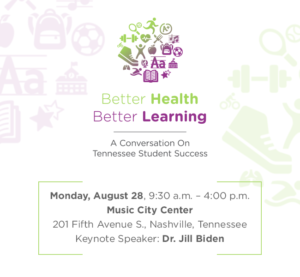 This post is part of Coffee and Conversation, a monthly interview series that highlights impactful, interesting work affecting Tennessee education. Lori Paisley, executive director of Coordinated School Health at the Tennessee Department of Education, joined us to talk about her organization and how health and academic achievement are interconnected. The interview has been edited for length and clarity.
This post is part of Coffee and Conversation, a monthly interview series that highlights impactful, interesting work affecting Tennessee education. Lori Paisley, executive director of Coordinated School Health at the Tennessee Department of Education, joined us to talk about her organization and how health and academic achievement are interconnected. The interview has been edited for length and clarity.
How are health and education related?
Lori Paisley: Research shows that healthy students are better learners. When students are healthy, they attend school more regularly and they focus more in class.
What is coordinated school health?
LP: Coordinated school health is the connection of physical, emotional, and social health through education with eight inter-related components, which improve student health and their capacity to learn through the support of communities, families, and schools working together.
Tennessee has made sizable investments in coordinated school health. Why is that money well-spent?
LP: That funding provides for each school system a coordinator along with basic resources to develop polices, partnerships and initiative that advance student health and improve academic outcomes. That’s where the coordinated aspect come from – it’s all these things to support students to be successful. Everything is coordinated, everything is through a partnership.
Since the inception of school health going statewide in 2007, our coordinators statewide have secured $164 million in grants and resources for school. So the state providing that funding has brought in an additional amount for students and schools.
What kind of outcomes have you seen from that large investment?
LP: Having the coordinator in place – the coordinator is the program, they are the champions of children’s health and staff wellness. They do health screenings, to screen students for any health issues that may be barriers for learning. The follow-up process looks different for each district, but the students are screened for BMI [body mass index], blood pressure, vision, hearing, cardiovascular fitness – which allow us to detect problems the students may be having in school and in life. The district will typically have a follow-up with a health report card, but if there’s something that needs to be followed up with a health provider, schools will reach out. Every two years students should be getting a health screenings.
You know, in Lenoir City, there was a student who through the screening, they found he had a hearing problem. They were able to get him to a healthcare provider, but they also found out that he had been having some behavior issues in the classroom and once the hearing problem was solved and he got the treatment and care he needed, they didn’t see that behavior issue anymore.
 Can you tell me about some promising practices you’ve seen in these districts?
Can you tell me about some promising practices you’ve seen in these districts?
LP: I always think of our community partners because St. Thomas [hospital system] in Rutherford County – they have this awesome bus that gives students well-child exams. It takes the equipment to the school, and the parents don’t have to take off of work and students don’t have to leave the school.
We collect data on return-to-class rates, and the most recent data shows that 89 percent of the time when students visit a school nurse, they are able to come back to class. But without a school nurse, the front office has to call mom and say come and pick him up. I think in terms of promising strategies, school nurses is a big one.
How can educators encourage health in their classrooms?
LP: It’s important to remember that Tennessee is the only state in the nation that has coordinated school health in every school district. No matter where teachers are in Tennessee, you have a coordinator. So definitely contact your coordinator if you’d like to support this. Also, every school has a healthy school team. Those teams meet to discuss the needs of their school, and they also do the school health index, which is from the CDC and it’s an assessment of these eight component areas for their particular school.
Another way to incorporate health into the classroom is being a good role model. Staying active and being healthy speaks volumes to students and families. Teachers can incorporate health into their classrooms by ensuring students have opportunity for physical activity at the school and in their classrooms and incorporating the health and education standards into their lessons.
SCORE is partnering with NashvilleHealth for a health and education summit at the end of August. Why do you think that event will be important to the conversation in Tennessee?
LP: I’m presenting at that! I’ll be sharing more about coordinated school health. We have a lot to show, we’re a state who has made continual investments in children’s health. This summit is going to be such an exciting time to show what we know in Tennessee and continue to learn new things, so we can continue to expand on what we’ve already done here.
What’s your afternoon pick-me-up?
LP: I usually have a regular cup of coffee, so a white chocolate mocha is definitely an afternoon pick-me-up.
Want to know more about the Better Health, Better Learning summit on Monday, August 28, 2017, in Nashville? See the agenda and then register.
